Small overlap front: driver-side
Rating applies to 2009-14 models
Tested vehicle: 2012 Acura TL 4-door
The Acura TL was redesigned for the 2009 model year. Two tests of the TL were conducted because the onboard (car interior) cameras failed during the first test. As a result, the restraints and dummy kinematics rating is based primarily on the second test although camera views from outside the car suggest that there were very similar results in the first test. Injury and structural ratings are based on both tests.
| Evaluation criteria | Rating |
|---|---|
| Structure and safety cage | |
| Driver injury measures | |
| Head/neck | |
| Chest | |
| Hip/thigh | |
| Lower leg/foot | |
| Driver restraints and dummy kinematics | |

Action shot taken during the second of two small overlap frontal crash tests.
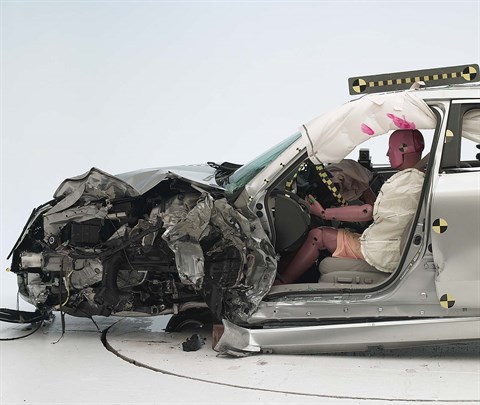
The dummy's position in relation to the door frame, steering wheel, and instrument panel after the second crash test indicates that the driver's survival space was maintained reasonably well (intrusion pattern in first test appeared very similar).
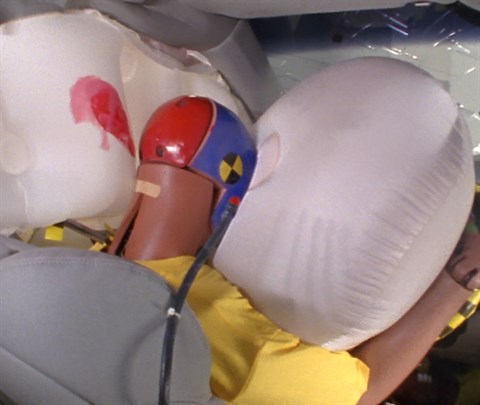
The frontal and side curtain airbags worked well together to keep the head from coming close to any stiff structure or outside objects that could cause injury.

Except for door hinge pillar deformation, intrusion into the driver's space was reasonably well controlled, and risk of injuries to the dummy's legs and feet was low (second test shown).
Measures of occupant compartment intrusion on driver side
| Evaluation criteria | Measurement | |
|---|---|---|
| Test ID | CEN1201 | CEN1214 |
| Lower occupant compartment | ||
| Lower hinge pillar max (cm) | 15 | 20 |
| Footrest (cm) | 11 | 6 |
| Left toepan (cm) | 2 | 2 |
| Brake pedal (cm) | 4 | 5 |
| Parking brake (cm) | 0 | 0 |
| Rocker panel lateral average (cm) | 5 | 2 |
| Upper occupant compartment | ||
| Steering column | 2 | 3 |
| Upper hinge pillar max (cm) | 9 | 12 |
| Upper dash (cm) | 9 | 11 |
| Lower instrument panel (cm) | 10 | 10 |
Driver injury measures
| Evaluation criteria | Measurement | |
|---|---|---|
| Test ID | CEN1201 | CEN1214 |
| Head | ||
| HIC-15 | 41 | 55 |
| Peak gs at hard contact | no contact | no contact |
| Neck | ||
| Tension (kN) | 0.7 | 0.7 |
| Extension bending moment (Nm) | 16 | 9 |
| Maximum Nij | 0.17 | 0.15 |
| Chest maximum compression (mm) | 25 | 27 |
| Femur (kN) | ||
| Left | 4.3 | 4.9 |
| Right | 0.2 | 0.1 |
| Knee displacement (mm) | ||
| Left | 10 | 5 |
| Right | 0 | 0 |
| Knee-thigh-hip injury risk (%) | ||
| Left | 2 | 3 |
| Right | 0 | 0 |
| Maximum tibia index | ||
| Left | 0.51 | 0.47 |
| Right | 0.42 | 0.48 |
| Tibia axial force (kN) | ||
| Left | 3.3 | 2.3 |
| Right | 0.3 | 0.3 |
| Foot acceleration (g) | ||
| Left | 75 | 73 |
| Right | 40 | 23 |
Moderate overlap front: original test
Rating applies to 2009-14 models
Tested vehicle: 2009 Acura TL 4-door
The Acura TL was redesigned for the 2009 model year. Frontal ratings are assigned by the Institute based on a test conducted by Honda.
| Evaluation criteria | Rating |
|---|---|
| Overall evaluation | |
| Structure and safety cage | |
| Driver injury measures | |
| Head/neck | |
| Chest | |
| Leg/foot, left | |
| Leg/foot, right | |
| Driver restraints and dummy kinematics | |
Measures of occupant compartment intrusion on driver side
| Evaluation criteria | Measurement |
|---|---|
| Test ID | VTF0814 |
| Footwell intrusion | |
| Footrest (cm) | 3 |
| Left (cm) | 12 |
| Center (cm) | 12 |
| Right (cm) | 8 |
| Brake pedal (cm) | 4 |
| Instrument panel rearward movement | |
| Left (cm) | 0 |
| Right (cm) | 0 |
| Steering column movement | |
| Upward (cm) | 0 |
| Rearward (cm) | 6 |
| A-pillar rearward movement (cm) | 1 |
Driver injury measures
| Evaluation criteria | Measurement |
|---|---|
| Test ID | VTF0814 |
| Head | |
| HIC-15 | 197 |
| Peak gs at hard contact | no contact |
| Neck | |
| Tension (kN) | 0.8 |
| Extension bending moment (Nm) | 33 |
| Maximum Nij | 0.18 |
| Chest maximum compression (mm) | 24 |
| Legs | |
| Femur force - left (kN) | 1.1 |
| Femur force - right (kN) | 3.2 |
| Knee displacement - left (mm) | 0 |
| Knee displacement - right (mm) | 0 |
| Maximum tibia index - left | 0.47 |
| Maximum tibia index - right | 0.52 |
| Tibia axial force - left (kN) | 2.4 |
| Tibia axial force - right (kN) | 2.8 |
| Foot acceleration (g) | |
| Left | 76 |
| Right | 54 |
Side: original test
Rating applies to 2009-14 models
Tested vehicle: 2009 Acura TL 4-door with standard front and rear head curtain airbags and standard front seat-mounted torso airbags
The Acura TL was redesigned for the 2009 model year.
| Evaluation criteria | Rating |
|---|---|
| Overall evaluation | |
| Structure and safety cage | |
| Driver injury measures | |
| Head/neck | |
| Torso | |
| Pelvis/leg | |
| Driver head protection | |
| Rear passenger injury measures | |
| Head/neck | |
| Torso | |
| Pelvis/leg | |
| Rear passenger head protection | |
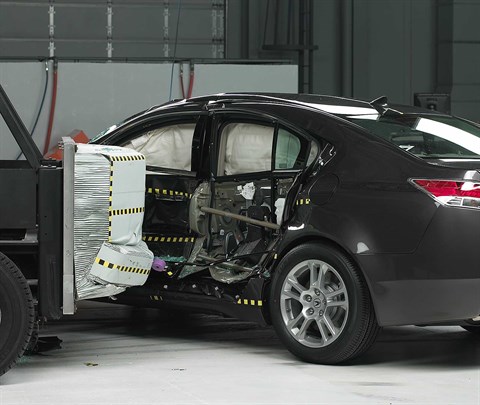
View of the vehicle and barrier just after the crash test.
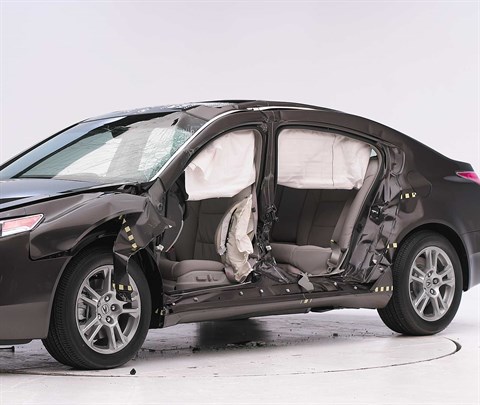
View of the vehicle after the crash with doors removed, showing the side airbags and damage to the occupant compartment.
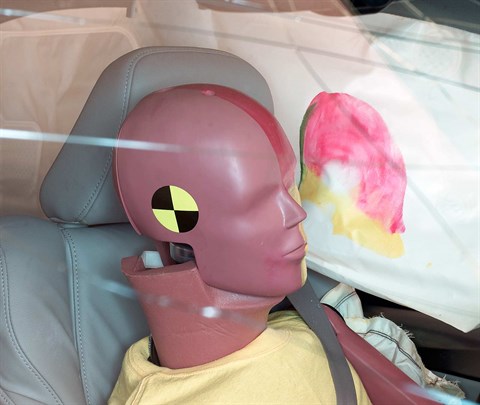
Smeared greasepaint shows where the driver dummy's head was protected from being hit by hard structures by the side curtain airbag.
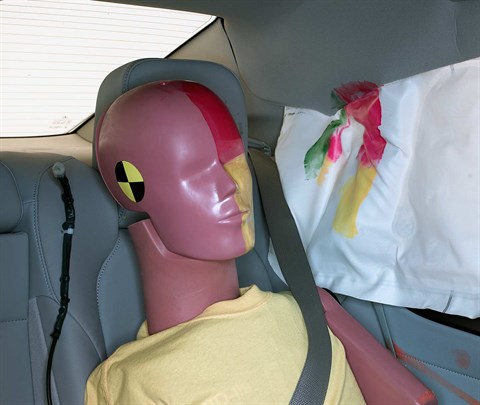
Smeared greasepaint shows where the rear passenger dummy’s head was protected by the side airbag.
Measures of occupant compartment intrusion on driver side
| Test ID | CES0847 |
|---|---|
| B-pillar to longitudinal centerline of driver's seat (cm) | -13.5 |
| Negative numbers indicate the amount by which the crush stopped short of the seat centerline. | |
Driver injury measures
| Evaluation criteria | Measurement |
|---|---|
| Test ID | CES0847 |
| Head HIC-15 | 245 |
| Neck | |
| Tension (kN) | 1.0 |
| Compression (kN) | 0.0 |
| Shoulder | |
| Lateral deflection (mm) | 56 |
| Lateral force (kN) | 1.6 |
| Torso | |
| Maximum deflection (mm) | 47 |
| Average deflection (mm) | 41 |
| Maximum deflection rate (m/s) | 3.96 |
| Maximum viscous criterion (m/s) | 0.81 |
| Pelvis | |
| Iliac force (kN) | 2.7 |
| Acetabulum force (kN) | 2.1 |
| Combined force (kN) | 4.5 |
| Left femur | |
| L-M force (kN) | 0.7 |
| L-M moment (Nm) | 122 |
| A-P moment (Nm) | 50 |
Passenger injury measures
| Evaluation criteria | Measurement |
|---|---|
| Test ID | CES0847 |
| Head HIC-15 | 230 |
| Neck | |
| Tension (kN) | 0.0 |
| Compression (kN) | 0.4 |
| Shoulder | |
| Lateral deflection (mm) | 41 |
| Lateral force (kN) | 1.2 |
| Torso | |
| Maximum deflection (mm) | 33 |
| Average deflection (mm) | 27 |
| Maximum deflection rate (m/s) | 2.64 |
| Maximum viscous criterion (m/s) | 0.44 |
| Pelvis | |
| Iliac force (kN) | 0.3 |
| Acetabulum force (kN) | 1.6 |
| Combined force (kN) | 1.7 |
| Left femur | |
| L-M force (kN) | 0.9 |
| L-M moment (Nm) | 159 |
| A-P moment (Nm) | -31 |
Roof strength
Rating applies to 2012-14 models built after September 2011
Tested vehicle: 2012 Acura TL 4-door
| Overall evaluation | |
|---|---|
| Curb weight | 3,710 lbs |
| Peak force | 17,057 lbs |
| Strength-to-weight ratio | 4.60 |
Head restraints & seats
Seat type: Power leather seats AHR
| Overall evaluation | |
|---|---|
| Dynamic rating | |
| Seat/head restraint geometry |
| Seat type | Power leather seats AHR |
|---|---|
| Geometry | |
| Backset (mm) | 36 |
| Distance below top of head (mm) | 31 |
| Seat design parameters | |
| Pass/fail | Pass |
| Max T1 acceleration (g) | 12.8 |
| Head contact time (ms) | 61 |
| Force rating | 1 |
| Neck forces | |
| Max neck shear force (N) | 3 |
| Max neck tension (N) | 222 |
About the head restraint & seat test
Currently, IIHS tests apply only to front seats.
